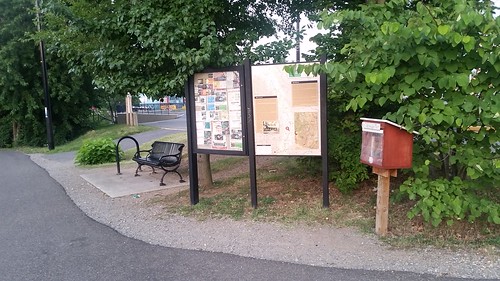Todd Bol, founder of the "Little Free Library" "movement," dies
Little Free Libraries are those bookstands in front of houses and sometimes businesses and other places, where people leave printed matter for others.
I thought they'd end up defaulting to a "mean" of schlock fiction (not that I don't read some of it), but that's not the case, at least in the DC area.
Collectively, LFLs have a wide range, including nonfiction, academic, and children's books, sometimes periodicals, CDs, and/or DVDs.
My best score, most recently, was Capital Losses.
Some like in Takoma Park, Maryland, are used as "community information points," where information on community events or elections will be put inside as well.
And the concept has sparked related ones. There's a LFL in Arlington County near the Thomas Jefferson Middle School and Community Center that distributes garden seeds, but apparently there are others (e.g., Little Free Seed Library | Equal Ground Community Gardens).
One, called Little Free Pantry, provides foodstuffs for people in need (although CityLab is dismissive, "The Little Free Pantry Can't Fight Hunger").
Another person has set up the equivalent with tennis rackets and balls, at community tennis courts ("'Little Free Sports Library' brings West Seattle families together," KING5-TV).
 While I am not as good at putting books in as I am at taking them, I do focus my giving including periodicals on the Little Free Library on the Metropolitan Branch Trail (left), feeling as a transportational cyclist that should be the one I support.
While I am not as good at putting books in as I am at taking them, I do focus my giving including periodicals on the Little Free Library on the Metropolitan Branch Trail (left), feeling as a transportational cyclist that should be the one I support.They are a great example of community giving, maybe not so much community building, because they are more of a one-to-one rather than a group activity.
In any case, they are a great contribution to community life.
Todd Bol, the creator of the concept, just died.
From "After terminal cancer diagnosis, Little Free Library founder feels like 'most successful person I know'," Minneapolis Star-Tribune:
Bol spoke for hours this month in his Hudson home about the power of the dollhouse-sized libraries and the people, whom his nonprofit dubs “stewards,” who care for them. “If I may be so bold, I’m the most successful person I know,” Bol said, with a sideways smile, “because I stimulate 54 million books to be read and neighbors to talk to each other. As far as I’m concerned, that’s the very definition of success. ...
But more and more, Bol sees the libraries as hubs, nudges, fulcrums. Books to get people reading — but also talking, listening, transforming. Little Free Library now works with law enforcement, turning police cruisers into bookmobiles. It launched Action Book Club last year, which encourages members to read books on timely topics, then do service projects together. The organization is also talking tutoring these days, because why not?
“Wouldn’t it be cool if every Little Free Library could connect you with tutoring?” Bol said, his eyes wide behind horn-rimmed glasses. “There are so many different ways of using Little Free Libraries as a spark within the community.”
Labels: civic engagement, community building, neighborhood revitalization




0 Comments:
Post a Comment
<< Home